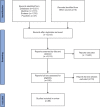Factors influencing healthcare professionals' confidence in vaccination in Europe: a literature review
- PMID: 35290160
- PMCID: PMC9009961
- DOI: 10.1080/21645515.2022.2041360
Factors influencing healthcare professionals' confidence in vaccination in Europe: a literature review
Abstract
Health-care professionals (HCPs) have a fundamental role in vaccination, their own beliefs and attitudes affecting both their uptake and recommendation of vaccines. This literature review (n = 89) summarises evidence on HCPs' perceptions of the risks and benefits of vaccination, trust, and perceptions of mandatory vaccination in Europe. HCPs across studies believed that vaccination is important to protect themselves and their patients. However, beliefs that some diseases such as influenza are less risky were reported by some HCPs as a reason for not getting vaccinated. Concerns about both short- and long-term side effects were identified among HCPs in most studies, such as those affecting the immune or neurological system. Mistrust toward health authorities and pharmaceutical industry was reported in some studies. The question of mandatory vaccination revealed mixed opinions, with some favoring self-determination and others viewing vaccination as a duty. This review highlights key factors influencing HCPs' confidence in vaccination in Europe.
Keywords: Health-care professionals; beliefs; benefits; confidence; effectiveness; mandatory; risks; safety; trust; vaccine hesitancy.
Conflict of interest statement
HJL/EK are part of research projects funded by GlaxoSmithKline plc (GSK), Merck Sharp & Dohme Limited (Merck), and Janssen; and received support for participating in Merck and GSK meetings. HJL is a member of the Merck Vaccine Confidence Advisory Board. The funders had no role in the design of the study; in the collection, analyses, or interpretation of data; in the writing of the manuscript, or in the decision to publish the results.
Figures
References
Publication types
MeSH terms
Substances
LinkOut - more resources
Full Text Sources
Medical


